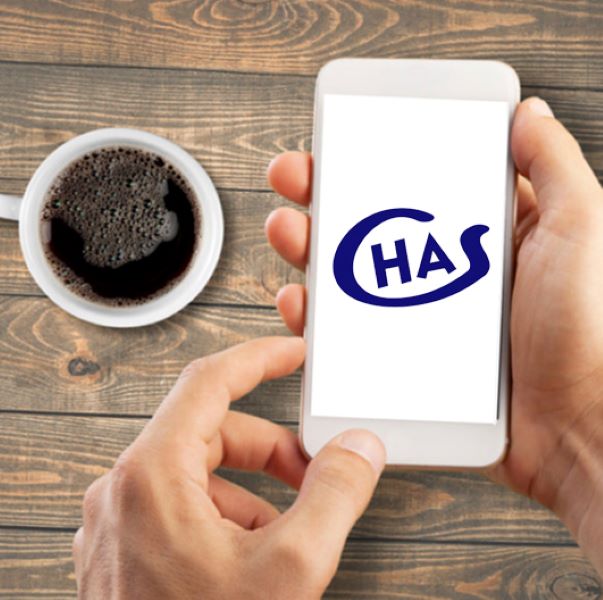CHAS is a health and safety accreditation scheme, primarily for the construction industry and often acts as a type of pre-qualification during the tender process. But, what exactly is CHAS accreditation, when do you need it, how much does it cost, and is it worth it?
If you work in construction, you have probably heard of CHAS. You might have seen the logo on the side of contractor vans, or you may have heard a client mention it in a meeting.
But, what exactly is CHAS accreditation?
What does CHAS stand for?
CHAS stands for the Contractors Health and Safety Assessment Scheme.
- Contractors
- Health and Safety
- Assessment
- Scheme
What is CHAS accreditation?
CHAS is a health and safety accreditation scheme, primarily for the construction industry and often acts as a type of pre-qualification during the tender process.
Some clients require CHAS accreditation before they will allow you to tender – this is seen more often in public procurements and commercial projects such as for councils, schools and other public sector bodies.
The purpose of CHAS is to help buyers (your potential clients) and suppliers (usually contractors) assess health and safety competence.
CHAS can help buyers by reducing the lengthy process of assessing contractors’ health and safety standards individually. CHAS can also help contractors like you by reducing the time-consuming process of completing and submitting full details of health and safety processes on each project they compete for.
But CHAS isn’t the only option. CHAS is one of several health and safety assessment schemes available to businesses. It is probably the most well-known because it was one of the first third-party health and safety accreditation schemes for the construction industry.
It’s basically a review of your health and safety management systems, you answer questions, supply evidence and if you meet the required standard, you get CHAS accredited.
When do you need CHAS?
CHAS isn’t a legal requirement – you don’t need it by law to work in construction or on construction sites. But while the law doesn’t require it, some clients can specify that you need it to work on their sites. It’s a common requirement for public sector (e.g. Government) and commercial contracts.
If that’s the case for your potential clients, you will need a valid CHAS certificate* to get in the door – or on the tender list!
What are CHAS accreditation requirements?
There are three levels of CHAS:
- CHAS Standard: SSIP requirements
- CHAS Advanced: SSIP + PAS91 requirements
- CHAS Elite: SSIP + PAS91 + Common Assessment Standard requirements
While the application forms and guidance notes are no longer available on the CHAS website since they moved to a fully online system, you can download a copy of PAS91 from BSI with section C4 matching the SSIP core criteria.
If you’re aiming for the elite level, you can download a copy of the Common Assessment Standard questions from Build UK.
How much does CHAS accreditation cost?
The cost of applying for CHAS accreditation can vary depending on the type of assessment you get, and how many employees you have.
For CHAS SSIP accreditation (CHAS standard), current prices go from £279 for one employee, to £1099 for over 1000 employees.
What are the benefits of CHAS accreditation?
The purpose of CHAS is to help both buyers and suppliers in the assessment of health and safety competence.
Helping buyers by reducing the lengthy process of assessing contractors’ health and safety standards individually. Helping suppliers (contractors) by reducing the time-consuming process of completing and submitting full details of health and safety processes on each project they compete for.
As a contractor, you’ll only have to have your health and safety assessed once a year, instead of completing health and safety pre-qualification questionnaires for each project you quote for.
When you pass the assessment, you will be provided with a certificate, and be allowed to use the CHAS logo. That means you can tell people you have reached the CHAS standard, you can put the logo on your stationery and vans, you can include a copy of your certificate when you are tendering for work, and you can get access to some exclusive work opportunities.
You’ll also go into the CHAS accredited contractors database, which CHAS clients can search. So you might get clients reaching out to you directly.
Even when clients don’t specifically require CHAS or an equivalent SSIP standard of accreditation, having that certificate can still help you by adding an extra level of trust and assurances for clients when you promote your business.
Is CHAS accreditation worth it?
You might also find the initial assessment process time-consuming and demanding – but remember, it’s a once-a-year assessment instead of an every-client-every-project assessment. It should save you time in the long run.
Without a third-party accreditation, there are often lengthy pre-qualification questionnaires (PQQs) to fill out. But, if you have already been assessed by CHAS or a similar scheme, you can often skip a large portion of the health and safety questions as these have already been assessed under your accreditation.
That can be a huge time saver if you are tendering for lots of projects because rather than completing a different PQQ in full for each opportunity; you just have your single annual CHAS assessment.
CHAS isn’t the cheapest way to get SSIP accreditation. In fact, it’s one of the more expensive routes. If you pass the SSIP level assessment with any SSIP member (of which CHAS is a founding member – but there are 15+ other members), you have reached the CHAS standard.
But CHAS remains one of the more popular accreditation schemes, with over 32,000 members. I think there are several reasons for its popularity:
- It’s been around a long time and is probably the most established
- Seems to be well staffed – so applications and enquiries get handled quickly
- The CHAS helpline is helpful to members and people going through the application
- Good brand recognition – especially with construction clients and contractors
In theory, other SSIP accreditation schemes should qualify you for the same clients, but it’s not always the case. Some clients may insist on one assessment scheme or another. Explaining that you have the same level of accreditation but from another SSIP member should be sufficient – but it’s not always.
CHAS is worth it if you:
- Don’t have an equivalent accreditation, and
- It’s the preferred accreditation for your (potential) clients, or
- You value the brand recognition CHAS has
How often does CHAS accreditation need renewing?
You’ll need to renew your CHAS accreditation annually.
There used to be different levels of compliance and accreditation, with compliance not requiring annual assessments. However, CHAS has since moved towards annual assessments for everyone, which helps to reduce the confusion between compliance and accreditation.
With CHAS accreditation UK, you are committing to yearly assessments to show you maintain the high levels of health and safety management required.
How do you get CHAS accreditation?
There is an online application on the CHAS website to complete. You will need to register with CHAS, pay the applicable fee, fill out the questionnaire and submit your supporting evidence.
Your application will then be passed to an assessor who will review the information submitted and let you know if you have passed, or they will ask for more information if your application fails.
The application process can be confusing to those unfamiliar with the procedure. It’s been reported previously that only 20% of contractors pass on the first attempt.
So it’s a good idea to familiarize yourself with the requirements before applying, so you can gather the needed paperwork and get everything ready for your assessment.
In our small contractors guide to SSIP application and approval, we go into more details about the requirements for SSIP (CHAS standard level) and what’s required.
For more info:-
CHAS Accreditation Assistance Uk
CHAS Health And Safety Accredited Contractor Uk
Safety Advisor For Electrical Contractor
Constructionline Accreditation Assistance Uk




